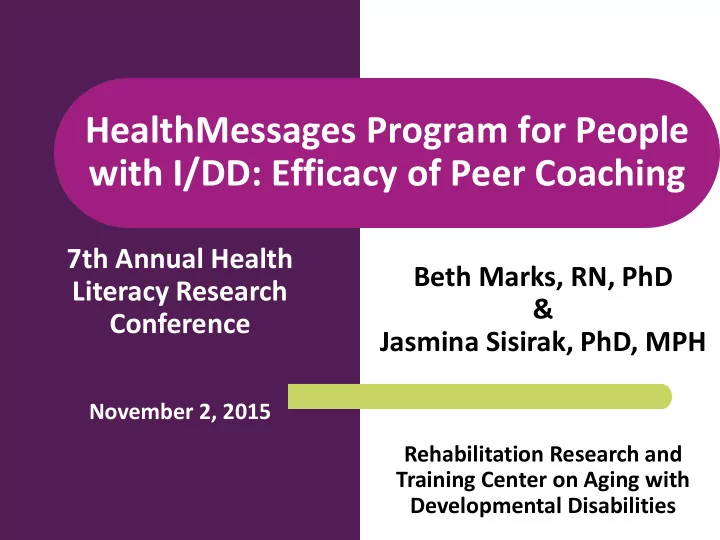

HealthMessages Program for People with I/DD: Efficacy of Peer Coaching 7th Annual Health Beth Marks, RN, PhD Literacy Research & Conference Jasmina Sisirak, PhD, MPH November 2, 2015 Rehabilitation Research and Training Center on Aging with Developmental Disabilities
Acknowledgements and Funding Acknowledgements • RRTCADD: Joan Medlen and Erika Magallanes • Special Olympics International: Amy Harris and Janelle Nanavati • Special Olympics Florida: Nancy Sawyer • Special Olympics Indiana: Michael Furnish and Pam Eakin • NorthPointe Resources: Dina Donohue-Chase and Kristin Krok Funding • Special Olympics International (Centers for Disease Control and Prevention's Disability and Health Branch, Grant # CRS514155) • RRTCADD, United States Department of Education, Office of Special Education and Rehabilitative Services, National Institute on Disability and Rehabilitation Research (Grant # H133B031134) • HealthMatters Community Academic Partnership, Eunice Kennedy Shriver National Institute of Child Health & Human Development 2 (NICHD), RC4HD066915
Peer-Led Health Initiatives Health disparities for people with intellectual and developmental disabilities (I/DD) – Earlier age-related health conditions – Poorer health status – Sedentary lifestyles, high fat diets, low fruit and vegetable intake Culturally and linguistically appropriate health education Expand health promotion research to include people with I/DD as peer health workers 3
Theoretical Components 1. Participatory Action Research – Joint process between stakeholders (SO athletes, ALPs coordinators, SO coaches, family members, other individuals who support SO athletes) and researchers 2. Bandura’s Social Cognitive Theory – Perception of the pros and cons of change, confidence in the ability to change, perceived level of social support to adopt a new behavior 3. Transtheoretical Model (TTM) of Behavior Change – Change behavior across five stages 4. Empowerment Theory 4 – Increasing power among stakeholders to take action to improve health
Design and Methods Phase 1: Development – Focus groups in two state in the U.S. (midwest and southeast) Phase 2: Peer to Peer HealthMessages Program Workshop – 20 SO ALPs Athletes (HLCs) and 19 Helpers in 2 states – Pre-test (T1)/Post-test (T2) Phase 3: 12-Week HealthMessages Program Implementation – SO Athlete Peers – Program Evaluation with Pre-test (T1)/Post-test (T2) – Athlete Peers 5 – Post-test (T3) – HLCs and Helpers
Research Questions What is the impact of the Peer to Peer HealthMessages Program Workshop for HLCs and Helpers on the following variables: 1. Self-Efficacy 2. Health Knowledge 3. Health Advocacy 4. Health Behaviors (program evaluation with peers) 5. Satisfaction and Impact 6
Peer to Peer HealthMessages Program Workshop: HLC Manual Learn how physical activity and drinking water can help our bodies. Talk about health messages to be more physically active and drink more water. Become a Healthy Lifestyle Coach (HLC) 7
HealthMessages HLC Coaches Manual 12 HealthMessages classes. Support health behavior change: – "Tell me…I forget” – “Show me…I remember” – “Involve me…I understand" 8
Weekly Lessons Agenda Talking Points Time Materials 9
Leadership Checklist 5 new skills 1.Delivery 2.Visual aids 3.Body Language 4.Audience Participation 5.Technical Competency 10
Weekly HealthMessages Peer Booklets Warm-Ups Get Ready Take Charge Pass it On 11
Demographics and Results Healthy Lifestyle Mentors (n=19) Coaches (HLCs) (n=20) Age 31.6 (SD=5.9) 54.7 (SD=12.9) Gender 55% (n=11) female 72.2% n=13 female Race 90.0%, n=18 white, not 88.3, n=15 white, not of of Hispanic Hispanic Education Special Education 61.1%, n=11 some Diploma was the college education highest (61.1%, n=11) Outcome Variables Self-Efficacy Self-Efficacy Hydration Knowledge Advocacy 12
Satisfaction HLCs Mentors Peers 90% stated that the 89% stated that the 92% Feel better after 12- HealthMessages HealthMessages week Program and 84% Workshop was great Workshop was great. said Program was fun would recommend the program to their peers to become HLCs. 95% liked Workshop 83% liked Workshop 81% Liked having peer be materials and 75% liked materials and 94% liked HLC the role play. the role play. 100% thought the 100% thought the 44% noted weight loss Workshop was worth their Workshop was worth their during Program time. time Helping peers learn about Watching people reach 58% wanted to learn more a healthier lifestyle goals each week and topics have “Ah - ha moments” 13
Next Steps Peer to Peer – Sample size – more participants to increase power – Fidelity – maintain consistency with implementation of 12-week Program – More control with setting, time-frame, commitment Changing the Conversation – Social participation vital for health and wellbeing – Health and well-being vital for social participation – Address individual and community health concerns through a broader scope of action (PAHO, 1999) 14
Contact Information Beth Marks, RN, PhD bmarks1@uic.edu 312-413-4097 Jasmina Sisirak, PhD, MPH jsisirak@uic.edu 312-996-3982 15
Recommend
More recommend